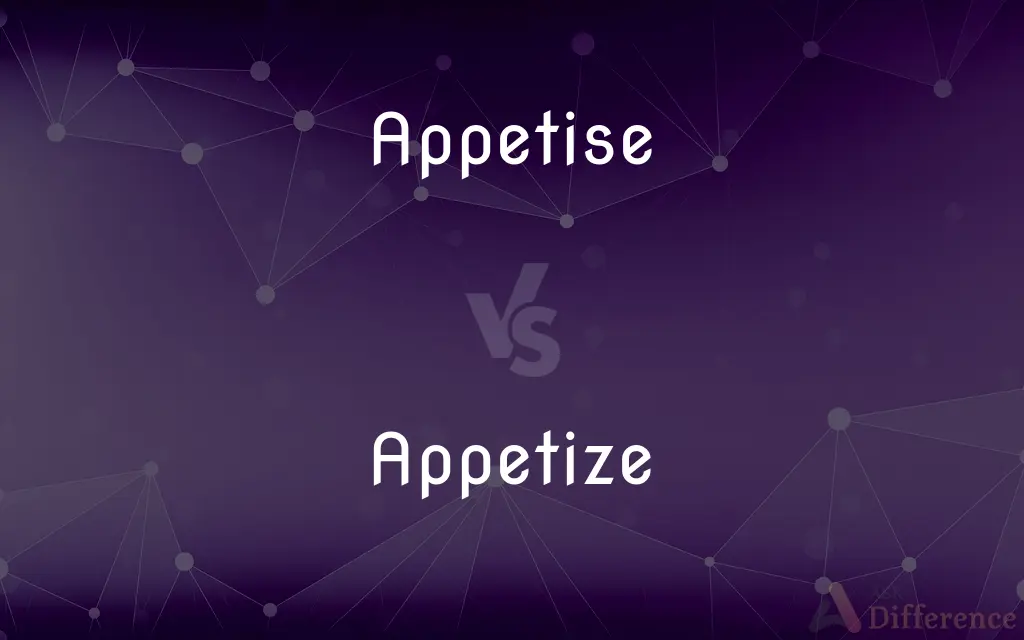Appetise vs. Appetize — What's the Difference?
By Maham Liaqat & Urooj Arif — Updated on May 4, 2024
Appetise and Appetize are variants spelling the same verb, which means to increase one's desire for food. Appetise is preferred in British English, while Appetize is more common in American English.

Difference Between Appetise and Appetize
Table of Contents
ADVERTISEMENT
Key Differences
Appetise is commonly used in British English to describe the act of stimulating or exciting the appetite. On the other hand, in American English, the spelling Appetize is predominantly used for the same purpose. Both terms derive from the word "appetite" and carry the same meaning across different English-speaking regions.
The pronunciation of "Appetise" and "Appetize" slightly differs due to regional accents, even though the difference is minimal. While British speakers might emphasize the softer 's' sound in "Appetise," American speakers use a more pronounced 'z' sound in "Appetize," reflecting the typical pronunciation patterns of each variant.
In terms of usage in written text, "Appetize" appears more frequently in American publications and literature, aligning with the American preference for words ending in "-ize." Whereas "Appetise" finds its place more often in British contexts, where "-ise" endings are standard.
Educational contexts also reflect these preferences; British schools teach "Appetise" as the correct form, aligning with the Oxford style of spelling. Conversely, American educational systems advocate for "Appetize," consistent with the Merriam-Webster guidelines.
Despite these differences, the function and application of the word in sentences are identical. For example, a chef might use techniques to appetise or appetize their dishes, depending on their location, but the intended meaning remains unchanged.
ADVERTISEMENT
Comparison Chart
Regional Usage
Preferred in British English
Preferred in American English
Pronunciation
Softer 's' sound
Pronounced 'z' sound
Common Spelling in Texts
Common in British publications
Common in American texts
Educational Standards
Taught in British schools
Taught in American schools
Endings
Uses "-ise" ending
Uses "-ize" ending
Compare with Definitions
Appetise
To stimulate the appetite.
The chef uses exotic spices to appetise the guests.
Appetize
To stimulate the appetite.
The new restaurant menu is designed to appetize its customers.
Appetise
To prepare the stomach for a meal.
A small appetiser can appetise you before the main course.
Appetize
To provoke interest in eating.
Watching the cooking show appetized him to try new recipes.
Appetise
To make food more appealing.
Garnishing is a great way to appetise a simple dish.
Appetize
To entice or attract to food.
The fresh scent of baked bread appetizes passersby.
Appetise
To provoke interest in eating.
The aroma from the kitchen began to appetise the party attendees.
Appetize
To prepare the stomach for a meal.
A light salad can appetize you without filling you up.
Appetise
To entice or attract to food.
The colorful presentation of the meal appetised the children.
Appetize
To make food more appealing.
Creative plating techniques can appetize even the simplest meals.
Appetise
(rare) To whet the appetite.
Appetize
(rare) To whet the appetite.
Appetize
To make hungry; to whet the appetite of.
Common Curiosities
Why does American English prefer "Appetize"?
American English generally favors "-ize" endings for verbs, aligning with spelling conventions like those found in Merriam-Webster.
Can "Appetise" and "Appetize" be used interchangeably?
Yes, they can be used interchangeably depending on the reader's or writer's preference for American or British English.
Are there pronunciation guidelines for Appetise and Appetize?
Yes, "Appetise" is pronounced with a softer 's' sound, and "Appetize" with a clearer 'z' sound.
Do dictionaries list both Appetise and Appetize?
Yes, major dictionaries like Oxford and Merriam-Webster list both variants, specifying regional usage.
Is there a difference in meaning between Appetise and Appetize?
No, both terms mean to stimulate or excite the appetite.
Why does British English use "Appetise"?
British English often follows the Oxford style guide, which prefers "-ise" endings for verbs.
Is one form older than the other?
Both forms have been in use for a similar length of time, evolving with the divergence of American and British English spelling conventions.
How should I decide which spelling to use?
Choose based on the primary audience of your writing. Use "Appetise" for British readers and "Appetize" for American readers.
What is the main difference between Appetise and Appetize?
The main difference is regional preference; "Appetise" is British, and "Appetize" is American.
How does the digital age affect the usage of Appetise and Appetize?
Digital spellchecks and auto-correct features may promote one spelling over the other, typically based on the user's location settings.
How do educational systems handle teaching these variants?
Schools teach the preferred regional spelling: "Appetise" in the UK and "Appetize" in the US.
Are there other words with similar British and American variations?
Yes, many verbs have similar variations, like "realise" and "realize" or "organise" and "organize."
Does context change the choice between Appetise and Appetize?
The context does not change the choice significantly, though writers may choose based on the cultural context or audience's familiarity.
Can I find both spellings in global English-language publications?
Yes, but each publication typically adheres to either American or British spelling standards.
Which variant is more popular globally?
"Appetize" is slightly more popular globally, likely due to the influence of American English.
Share Your Discovery

Previous Comparison
Roll vs. Wind
Next Comparison
Homework vs. AssignmentAuthor Spotlight
Written by
Maham LiaqatCo-written by
Urooj ArifUrooj is a skilled content writer at Ask Difference, known for her exceptional ability to simplify complex topics into engaging and informative content. With a passion for research and a flair for clear, concise writing, she consistently delivers articles that resonate with our diverse audience.
















































